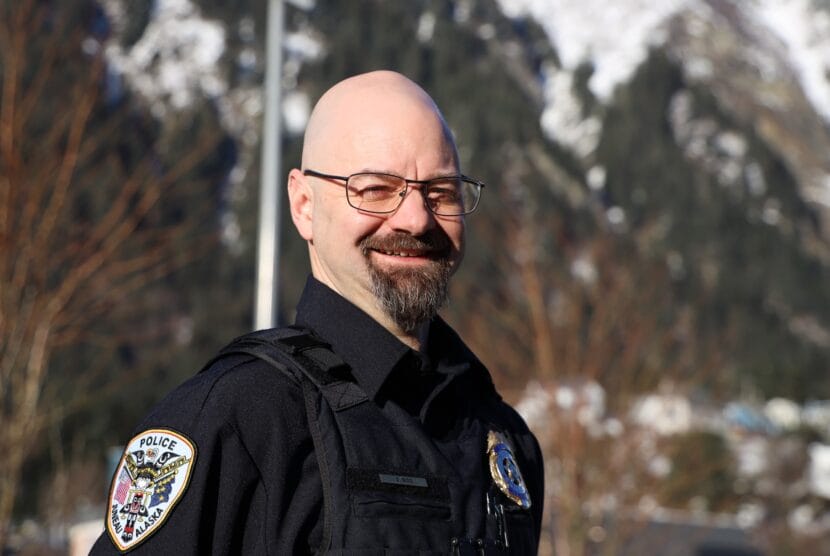
The new chief of the Juneau Police Department, Derek Bos, just finished his first week on the job after moving to Juneau from Colorado in late January.
The new chief sat down with KTOO to discuss police accountability, hiring and recruitment issues and his priorities for the department.
This interview has been edited for length and clarity.
Clarise Larson: So, when did you get here? And, what are your first impressions of Juneau?
Derek Bos: You know it’s a very warm, small-town feel, welcoming community — I haven’t met a stranger yet. You know, everyone has been quick to offer advice and help, so it’s been great.
Clarise Larson: What are your top priorities as you begin your position with this department?
Derek Bos: For me, priority number one is just learning. I would say the second priority, which is equally important if not more so even, is staffing. We’re definitely at a critical level for staffing. Specifically with patrol and dispatch. So, we have a great team – we just need more of it.
Clarise Larson: You applied to be Petersburg’s police chief in 2018, and were a candidate for the role in Wrangell in 2019 before landing the Juneau position. What drew you to Alaska?
Derek Bos: Several people have asked me already, you know, ‘You wanted to move to Alaska, but anywhere? Southeast is different,’ and the answer is we’ve always wanted to live in Southeast Alaska. Not just anywhere. You know, Southeast Alaska, to us, the snow for example, it’s what we love. But, it’s not the bitter cold of Fairbanks. Shoutout to those people, they’re brave — I’m not doing that — that’s a little cold. But, just the perfect mix of climate, outdoor opportunity, living by the ocean, and yet you have mountains. So, Southeast really to my family and I is the perfect location from every aspect.
Clarise Larson: The Juneau Police Department has struggled with staffing shortages in recent years. And, as of today, the department reported being down 14 sworn officers. Do you think the challenge of hiring and retaining officers is different here than in the lower 48?
Derek Bos: Absolutely, I think I would be remiss to say it’s not. But at the same token, I think we face the same issues that have created the staffing shortages. For example, housing, the cost of housing, has been a big challenge here. But that’s also something you see in pockets in the lower 48, so there are similarities. But, much more unique to Alaska I think is just a smaller workforce in general and everybody needs employees. So, we just have a smaller pool to attract and pull from whether we’re competing with private industry or other parts of the city or state. There’s just a smaller workforce. So, that’s a very unique challenge. And I think it’s a tough sell to bring people from out of the area up here. Obviously, I love Alaska so far, but there’s a lot of people where it might not be for them.
Clarise Larson: What’s your philosophy on building relationships with the community and how do you think that impacts the work you do?
Derek Bos: Really, I’ve changed my philosophy over the past few years. And, I think it’s taking a step back from the institutional level and saying ‘The police department needs a relationship with the school district.’ It has to be more on the individual level. So, the relationships have to be built between the individuals in the community and the individual officers. I can’t shake the hand of everybody in the city of Juneau — it’s just physically not possible. But, the department on the whole, we can. So, really my philosophy on relationships is to encourage the officers to get out and build friendships, built relationships with the community members.
Clarise Larson: Much of the national conversation around policing in recent years has increased focus on police accountability. Things like the use of force, body-worn cameras and the racial makeup of departments have been publicly scrutinized. How does that factor into your leadership choices here in Juneau?
Derek Bos: We do have to respect people’s rights, we have to be careful with investigations, sensitive to victims. But, at the same token, there is very little that we do that needs to be a secret. I have no problems being open with the community as much as possible. You know, there are certain times where during an active investigation we absolutely can’t say things to protect victims and to protect suspects and suspect’s rights even. But, that doesn’t mean we need to be closed-mouthed, and it doesn’t mean we need to be secretive. And, I think that’s step one in accountability, is not even the body cameras or some of the other elements there. But, just being open and honest with our community really helps us be accountable. When we pretend like we have secrets, which we don’t, it looks bad. And, so people even look and say, ‘Well, something is not right there,’ and whether there is or isn’t, it gives a negative appearance. So, I think that open frank honesty with the community is step one of accountability. And, that’s back to the leadership piece of that – I think that’s what I look for in my leaders. We have nothing to hide, so let’s be open and honest with our communities. Let’s talk to people, let’s take on those hard questions and answer them, rather than dodge them.